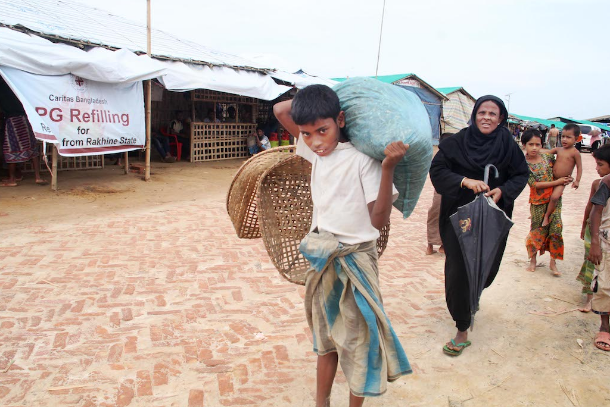
Refugees in Bangladesh keen to return to Myanmar but want assurances of safety after ‘broken promises’
Rohingya refugees at Kutupalong refugee camp in Cox’s Bazar district of Bangladesh on Sept. 2. They have greeted news of their repatriation starting mid-November with optimism and skepticism. (Photo by Rock Ronald Rozario/ucanews.com)
Stephan Uttom and Rock Ronald Rozario in Dhaka and John Zaw in Mandalay
Asia
October 31, 2018
Rohingya refugees in Bangladesh have mixed feelings over a new refugee repatriation plan drawn up by state officials.
Repatriation for Rohingya Muslims to Myanmar is to start in mid-November, Bangladesh Foreign Secretary Shahidul Haque said on Oct. 30.
“This repatriation is a complex process. It needs political will. We feel Myanmar has the will,” he said.
Haque spoke to journalists in Dhaka after the latest meeting of the Joint Working Group (JWG) of Bangladesh and Myanmar officials to oversee repatriation of more than 800,000 Rohingya who fled to Bangladesh to escape military crackdowns in Rakhine State.
Myint Thu, permanent secretary of Myanmar’s Foreign Ministry, who co-chaired the meeting, also said repatriationwould start next month.
“We have the political will for the repatriation. We will begin the process next month,” Myint Thu told media.
“We have streamlined a lot of directives. We are instructing the police to work with the local community in maintaining law and order. We have been conducting awareness workshops among the police so that they do not discriminate against Rohingya people.”
The Myanmar delegation, however, did not elaborate on how many Rohingya would be repatriated or provide details of rehabilitation and security arrangements.
JWG delegates were scheduled to visit refugee camps in Cox’s Bazar on Oct. 31 as part of their preparatory assessment for the repatriation plan.
Rohingya refugees in Bangladeshi camps welcomed the announcement halfheartedly.
Shobir Ahmed, 30, a Rohingya from the Maungdaw area of Rakhine, moved to Bangladesh in November 2017 and lives in Kutupalong refugee camp with his eight-member family.
He says refugees want to return home but don’t have full trust in promises made by Myanmar.
“Myanmar broke promises several times, so we have reasons for doubt,” Ahmed told ucanews.com. “I will go back with all to Myanmar. But first the Myanmar government must promise that our ancestral land and property are returned, we will be allowed to live in safety and peace, and that we will get citizenship and basic rights.”

A Rohingya man walks near an under-construction road at Kutupalong refugee camp in Cox’s Bazar district of Bangladesh on Sept. 2. (Photo by Rock Ronald Rozario/ucanews.com)
Firoze Uddin, 30, a Rohingya from Maungdaw, expressed similar sentiments.
“Unless the promises are written and recorded, we have doubts over Myanmar promises. Rohingya would believe the promises if the U.N. is involved in the process and ensures that we could live freely as citizens of Myanmar. With our demands met, every Rohingya would go back to their ancestral land,” Uddin, head of a five-member family in Balukhali refugee camp, told ucanews.com.
James Gomes, regional director of Catholic charity Caritas Chittagong, expressed concerns about a lack of detailed information on the repatriation plan.
“Repatriation largely depends on the eagerness of Myanmar because refugees are to return there. We have seen Rohingya continue to arrive in Bangladesh in small numbers, which raises questions about whether the situation in Rakhine is favorable for their return,” he told ucanews.com.
Kyaw Min, chairman of the Yangon-based Democracy and Human Rights Party, said the agreement to start repatriation in mid-November follows pressure from China and India and the international community.
“In practical implementation, I think there is little prospect of many people returning to Rakhine as they fear for their security,” he told ucanews.com.
Kyaw Min said the consent of refugees is important and Bangladesh should not force them to go back to Myanmar.
Stephane Dujarric, spokesman for the U.N. secretary-general, said repatriation should not be rushed.
“I think we can’t stress enough that returns cannot be rushed or premature, and the decision on whether to return should be determined by the refugees themselves when they feel the time and the circumstances are right,” he told a press briefing on Oct. 30.
“For UNHCR, the conditions in Rakhine State are not yet conducive for a return to Myanmar. At the same time, we are seeing Rohingya refugees continue to arrive from Rakhine into Bangladesh, which should give you an indication of the situation on the ground.”
